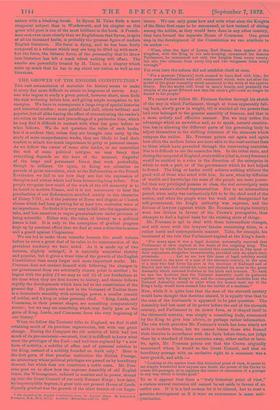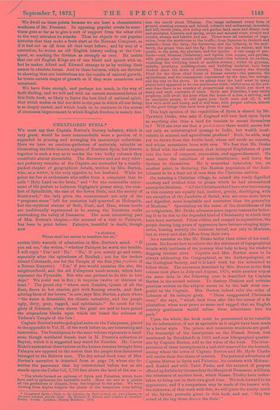THE GROWTH OF THE ENGLISH CONSTITUTION.* Tim. vast accumulation of
materials for history seems to make it every day more difficult to attain to largeness of survey. Any- one who begins to study a given period, however short, soon finds the task widening before him, and giving ample occupation to his energies. We have in consequence a large crop of special histories and historical studies ; some painful and dull, others brilliant and popular, but all alike having the effect of concentrating the reader's attention on the actors and proceedings of a particular time, which he may find it difficult to connect with what has gone before or what follows. We do not question the value of such books, but it is evident that, unless they are brought into unity by the study of more comprehensive works, they are likely to lead their readers to attach too much importance to petty or personal causes. As we follow the career of some able leader, or see unravelled the web of some political intrigue, we may fancy that everything depends on the hero of the moment, forgetful of the large and permanent forces that work powerfully, though in stillness. Or again, in fixing our attention on periods of great convulsion, such as the Reformation or the French Revolution we fail to see how they are but the expression of thoughts and wishes which had been fermenting long before. Few people recognise how much of the work of the old monarchy is to be found in modern France, and it is not uncommon to hear the peculiarities of our Reformation ascribed mainly to the character of Henry VIII., as if the jealousy of Rome and disgust at Church abuses which had been growing for at least two centuries were of no importance. No doubt it is very easy to fall into the opposite mis- take, and lose ourselves in vague generalisations under pretence of being scientific. Either way, the value of history as a political lesson is lost. It is only in the conception of gradual progress kept up by constant effort that we find at once a stimulus to action -and a guard against Utopianism.
We are led to make these remarks because the small volume before us owes a great deal of its value to its counteraction of the prevalent tendency we have noted. As it is made up of two lectures, slightly enlarged, it is naturally somewhat sketchy and popular, but it gives a truer idea of the growth of the English Constitution than many larger and more important works. Mr. Freeman does not content himself with following the changes in our government from one arbitrarily chosen point to another ; he begins with the polity (if we may so call it) of our forefathers at the time when they are first known.to history, and thence follows rapidly the developments which have led to the constitution of the present day. He points out how in the Germany of Tacitus there is a democratic assembly with sovereign power, a smaller council of nobles, and a king or other personal chief. "King, Lords, and Commons, in their present shapes, are something comparatively recent ; but we may see something which may fairly pass as the germ of King, Lords, and Commons, from the very beginning of our history."
When we follow the Teutonic tribe to England, we find it still retaining much of its previous organizstion, but with one great change. During the Conquest the old nobility of birth had lost much of its pre-eminence—so much, that it is difficult to know what were the privileges of the Earl—and had been replaced by " a new form of nobility, a nobility of office and of personal relation to the King, instead of a nobility founded on birth only." Here is the first germ of that peculiar institution the British Peerage, an aristocracy whose political privileges are passed on by hereditary .descent, but which does not constitute a noble caste. Mr. Free- man goes on to show how the supreme Assembly of old English times, the Witenagemot, reduced in number and in power, shrank op into the Great Council of our early Norman Kings; how later, by imperceptible degrees, it grew into our present House of Lords. Equally gradual was the growth of the other branch of our Legis- • The Ormeth of Me English Constitution from the Earliest Timm By Edward A. Freeman, M.A., Hon. D.C.L. London: Macmillan and Co. 1872.
lature. We can only guess how and with what aims the Knights of the Shire firet came to be summoned, or how instead of sitting among the nobles, as they would have done in any other country, they here formed the separate House of Commons. One great step in the development of the Constitution we can attribute to its author :—
" When, after the fight of Lewes, Earl Simon, then master of the kingdom, with the King in his safe-keeping, summoned his famous Parliament, he summoned not only two knights from every county, but also two citizens from every city and two burgesses from every borough."
Yet even here the reform did not establish itself at once.
"For a moment [Simon's] work seemed to have died with him; for some years Parliaments were still summoned which were not after the model of the great Assembly which answered to the writs of the captive Henry. But the model still lived in men's hearts, and presently the wisdom of the great Edward saw that his uncle's gift could no longer be denied to his people."
We cannot now follow Mr. Freeman further through his sketch of the way in which Parliament, though at times apparently fall- ing back, slowly grew in weight, till it wielded all the powers that had ever belonged to the general assembly of freemen, and that in a more orderly and effective manner. But we may notice the advantage which an unwritten and, so to speak, natural constitu- tion has in allowing the different parts of the governing body to adjust themselves to the shifting relations of the elements which compose the nation. Mr. Freeman points out again and again how often the modern forms are more akin to the most ancient than to those which have prevailed through the intervening centuries. Nor is it difficult to see the reason for this. In the tribal state, and during the conquest of England, every soldier (that is, every freeman) would be entitled to a voice in the direction of the enterprise in which he took a part, or of the government which he had helped to found. The king or leader could achieve nothing without the good-will of those who acted with him. So now, when by diffusion of wealth and knowledge the mass of the people are more power- ful than any privileged persons or class, the real sovereignty rests with the nation's elected representatives. But in an intermediate period, when unity was instinctively felt to be the chief need of the nation, and when the people were too weak and disorganised for self-government, the kingly authority was supreme, and the fictions of lawyers (against which Mr. Freeman inveighs bitterly) were less devices in favour of the Crown's prerogative, than attempts to find a logical basis for the existing state of things.
Mr. Freeman is apt to deal with these intermediate changes, and still more with the lawyers' fancies concerning them, in a rather harsh and unsympathetic manner. Take, for example, his treatment of the rule that Parliament expired at the King's death :
"For many ages it was a legal doctrine universally received that Parliament at once expired at the death of the reigning king. The argument by which the lawyers reached this conclusion is, like most of their arguments, altogether unanswerable, provided only we admit their premisses Let us see how this mass of legal subtlety would have looked in the eyes of a man of the eleventh century, in the eyes of a man who had borne his part in the elections of Eadward and of Harold, and who had raised his voice and clashed his arms in the great Assembly which restored Godwin° to his lands and honours. To such an one the doctrine that the National Assembly could be gathered together only by the King's writ, and the consequent doctrine that the National Assembly ceased to exist when the breath went out of the King's body, would have seemed like the babble of a madman."
Now, while it is quite true that the man of the eleventh century would have thought this doctrine absurd, it is equally true that to the man of the fourteenth it appeared to be past question. The Assembly had lost most of its power before the end of the eleventh century, and Parliament in its newer form, as it shaped itself in the thirteenth century, was simply a consulting body, summoned by the King to give him advice, or perhaps rather information. The rule which provokes Mr. Freeman's wrath has been wisely set aside in modern times, but we cannot blame those who framed their theories in accordance with the facts before them, nor judge them by a standard of three centuries away, either earlier or later. So, again, Mr. Freeman points out that the Crown originally summoned whom it would to the Great Council, and that an hereditary peerage with an exclusive right to a summons was a later growth, and adds :—
"Looking at the matter from this historical point of view, it seems to me simply wonderful how anyone can doubt the power of the Crown to create life-peerages, or to regulate the tenure or succession of a peerage in any way which it thinks good."
To us it appears that from a "truly historical point of view," a custom several centuries old cannot be set aside in favour of an earlier one. If it is a bad custom let it be altered, but to treat a genuine development as if it were an excrescence is mere anti- quarianism. We dwell on these points because we see here a characteristic weakness of Mr. Freeman. In opposing popular errors he some- times goes so far as to give a sort of support from the other side to the very mistakes he attacks. Thus he objects to our popular histories that they make a fresh start at the Norman Conquest, as if it had cut us off from all that went before ; and by way of a corrective, he writes an old English history ending at the Con- quest, so marking the division as strongly as ever. He insists that our old English Kings are of one blood and speech with us, but he makes Alfred and Edward strange to us by writing their names in obsolete forms. And in these lectures, which are devoted to showing that our institutions are the results of natural growth, he treats certain stages of growth as if they were monstrous and unnatural.
We have done enough, and perhaps too much, in the way of fault-finding, and we will end with an earnest recommendation of this little book, as likely to foster the best kind of national spirit, that which makes us feel our debt to the past in which all our being is so deeply rooted, and which leads us to continue in the course of strenuous improvement to which English freedom is mainly due.



































 Previous page
Previous page